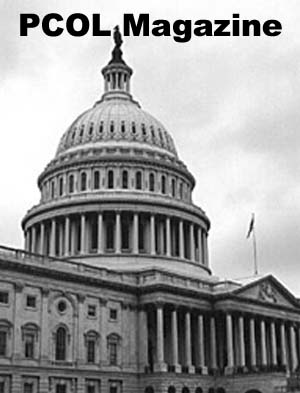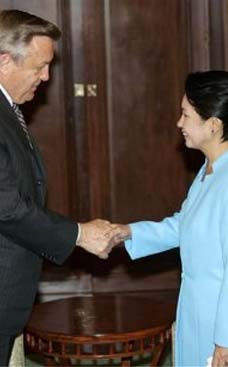
The lack of transparency in the Peace Corps medical screening process is a major disincentive for all applicants, especially older people who are more likely to have complicated questions about their medical status. The bill does not propose to change the standards of who is accepted or rejected; it simply enhances the transparency (and fairness) of the process. We found the process to be difficult to work through. We were highly motivated to serve, so we suffered through it, but the process was needlessly opaque and seemed designed to maximize the power of the screeners and minimize the power of the applicants. We can see clearly that for a less motivated applicant, the process would be intolerable.
14. Testimony of Chuck Ludlam and Paula Hirschoff on S. 732: The Peace Corps Volunteer Empowerment Act: Transparency of Medical Screening Process
Transparency of Medical Screening Process
The lack of transparency in the Peace Corps medical screening process is a major disincentive for all applicants, especially older people who are more likely to have complicated questions about their medical status. The bill does not propose to change the standards of who is accepted or rejected; it simply enhances the transparency (and fairness) of the process.
We found the process to be difficult to work through. We were highly motivated to serve, so we suffered through it, but the process was needlessly opaque and seemed designed to maximize the power of the screeners and minimize the power of the applicants. We can see clearly that for a less motivated applicant, the process would be intolerable. A detailed description of our experience with the process has been published in PeaceCorpsOnLine and is printed in Appendix D.
The bill contains a number of needed reforms in this area. First, the Peace Corps has developed medical screening guidelines. We found out about the guidelines inadvertently when a staffer stated that a certain medical test seemed to be out of line with the "guidelines." (The test results were not, in fact, out of line.) We immediately asked to see the guidelines, which led to a multi-month struggle with the Peace Corps over whether they'd reveal them to us. When Chuck finally threatened to file a Freedom of Information Act (FOIA) request for the guidelines, the relevant portions were sent to us. We were dismayed to find that these portions of the guidelines were considerably out of date with current medical information.
Just before we left for Peace Corps service, Chuck submitted a FOIA request for all the guidelines. It took us seven months to obtain them; we were forced to pay to copy the electronic files (about $360), and the original electronic copy sent to us was unreadable. When we finally got a usable copy, PeaceCorpsOnLine published them, along with a detailed cover memo about our experience with the medical selection process. Thus, the guidelines are now in the public domain. Given they are now public, the Peace Corps has no reason to refuse to post them.
Chuck published them reluctantly. When he had won the right to a copy of the guidelines, he invited the Peace Corps to publish them itself. He thought that the Peace Corps could explain the guidelines in its own words. He forwarded a copy of his explanation, which he said he would publish if the Peace Corps didn't publish its own explanation. It would not listen to this proposal and refused to publish the guidelines or to give Chuck edits or comments on his explanation. Thus, Chuck had the guidelines published along with his commentary.
His commentary in PeaceCorpsOnLine proposed an agenda of reforms of the medical screening process, not just a posting of the Guidelines. In April 2006 Congressional staff forwarded these medical screening reforms to the Peace Corps with a request for comments. The Peace Corps never responded to the inquiry. These reforms were raised again at Director Ron Tschetter's confirmation hearings last year and he promised to check into the issue. Chuck forwarded them to Director Tschetter by email in September 2006 and received only a perfunctory acknowledgement from his staff. Thus, it appears that the Peace Corps does not understand the relevance of the reforms to the recruitment of older Volunteers. These reforms are all mandated in the legislation. They are summarized here:
a. Publishing Medical Screening Guidelines: Section 301(1) provides that the Peace Corps shall publish on the internet its Medical Screening Guidelines. This is simple task and long overdue. Given that they are already public information on PeaceCorpsOnLine, there should be no objection to publishing them on the Peace Corps website. In giving them to Chuck pursuant to a FOIA request, Peace Corps acknowledged that these documents are appropriate for the public domain.
b. Description of Medical Screening Process: Section 301(4) provides that the Peace Corps shall publish on line a detailed description of the medical screening process including definitions of all terms of art for the various stages and status of the process. Key terms of art, including, "deferment" and "medical accommodation" are nowhere available to the applicant. This lack of transparency is discouraging to all Volunteers but especially to more experienced/older applicants.
c. Proposing Amendments to Guidelines: Section 301(2) provides that the Peace Corps shall establish a process for applicants or others to propose amendments to the Guidelines. There is no process now for proposing amendments to the Guidelines, some of which are considerably out of date.
d. Basis for Appealing Rejection: Section 301(3) provides that Volunteers who are rejected on medical grounds shall be permitted to appeal based on the inadequacy of the Guidelines. At present, Volunteers who are rejected can only appeal the facts of their case; they cannot challenge the adequacy of the Guidelines. Given that some of the guidelines are out of date, this is unfair to the applicant.
e. List of Medical Conditions: Section 301(1)(A) provides that the Peace Corps shall publish online a list of medical conditions that would normally disqualify Peace Corps applicants. We believe that such a list exists, and we found it listed recently on the Peace Corps website but it couldn’t be opened or downloaded. This is of special interest to more experienced/older applicants who should be able to determine whether they are likely to be rejected before going through the arduous application process.
f. List of Medical Accommodations: Section 301(1)(B) provides that the Peace Corps shall publish online a list of medical conditions that would normally lead to a "medical accommodation" and a list of the countries available to accept Volunteers with such accommodations. This is useful information for applicants.
g. Non-Disclosure of Medical Information: Section 301(5) provides that applicants shall be apprised of the meaning and implications of a failure to disclose medical information. Failure to disclose is a major issue for the Peace Corps and applicants. The Peace Corps challenges many Volunteers during pre-service training in country about their failure to disclose what they may have considered minor medical history. Yet volunteers are not well advised on the meaning of "failure to disclose" or the consequences if they fail to disclose a medical condition.
h. Full Reimbursement for Medical Tests: Section 301(6) states that the Peace Corps shall fully reimburse applicants for all medical tests that the Peace Corps requires them to take. Now applicants must pay out of pocket for certain medical tests, without any reimbursement, before the Peace Corps will begin to consider their applications. This is a serious disincentive for more experienced/older applicants. Reimbursement for other tests after the application is accepted is often insufficient to cover costs. We paid $2000 out of pocket for mandatory medical tests for which we were not reimbursed.20
i. Extending Post COS Medical Insurance Coverage Cost: Section 303 requests the Peace Corps to submit cost estimates for providing six months' worth of medical insurance to all Volunteers after their close of service, rather than the current practice of providing only one month's worth.
The NPCA survey found overwhelming support for the proposed reforms of the Peace Corps medical screening process, with 96% agreeing that the Peace Corps medical screening guidelines should be published on the web together with lists of the conditions that typically disqualify individuals and the countries where certain medical conditions can be "accommodated." Only 3% disagreed. And 82% agreed that the Peace Corps should establish a process for interested parties "to propose changes to medical guidelines." Just 16% disagreed. Some 87% agreed that the Peace Corps should establish "an appeal process for volunteer rejections based on medical grounds." Only 10% disagreed.21 And 88% agreed that applicants should be fully reimbursed for the costs of "medical tests Peace Corps requires for volunteers and applicants." Just 10% disagreed. Finally, 94% agreed that the Peace Corps should report to the Congress on "the costs and policy issues associated with extending–from one month to six months–the period of health coverage provided volunteers upon completion of service." Just 15% disagreed.
In written comments on these provisions, many said that the medical screening procedures are "too difficult, often too slow and can sometimes create disincentives to service." Special concerns were raised on the need for full (or at least improved) reimbursement for medical expenses. Some noted current procedures can impact service for individuals with limited income. Other comments referenced issues including the importance of reforms for the successful recruitment of older volunteers, reviewing policies for applicants who have undergone counseling or other mental health issues and medical decisions on individuals with physical handicaps. Following are a few of the comments:
I recruited 30 years ago and was disappointed recently to learn that seeking the advice of a therapist was still a disqualifier. When will PC join the 21st Century in realizing that psychotherapy is a healthy response to life? It is those who do not seek therapy who might pose a threat to a successful PC sojourn.
RPCV/Former Staff, Marshall, VA, Liberia, 72-75
I just got medical clearance. What a process! Big changes are needed, especially since the Peace Corps is trying to encourage older volunteers with the new 50+ program. I can't imagine how even the healthiest retiree could pass the screening... Peace Corps Applicant
Peace Corps Volunteers should reflect the diversity of the United States, including those with disabilities.
RPCV, Minneapolis MN, Morocco, 1971-1974
It would be extremely helpful if PC reimbursed the full amount of tests required. I had to pay several hundred dollars out of pocket. This is quite a disincentive. RPCV, Ukraine/Moldova, 2004-2005
If the Peace Corps is listening to the Volunteers, it will support these provisions.
The comment about the Peace Corps intolerance toward applicants who have sought psychological counseling is particularly apt for older applicants. Perhaps older applicants who have experienced a divorce should be disqualified if they have not secured counseling to deal with the trauma and transition. The Peace Corps should consider it a sign of intelligence and common sense for an applicant to seek counseling and give a preference for doing so. Volunteers who have faced their problems with the help of professionals are probably more reliable and less likely to Early Terminate (ET). In the loneliness and isolation at site, you often have only yourself for support and your self awareness and confidence to sustain you. Dealing forthrightly with your fears and failures is a sign of strength, not failure. The most vulnerable are those who have not processed their fears and failures.
Below, in "Additions to the Legislation," we discuss additional medical issues important to Volunteers that should be addressed in the legislation.



















